Virus Expert Joins Cleveland Clinic
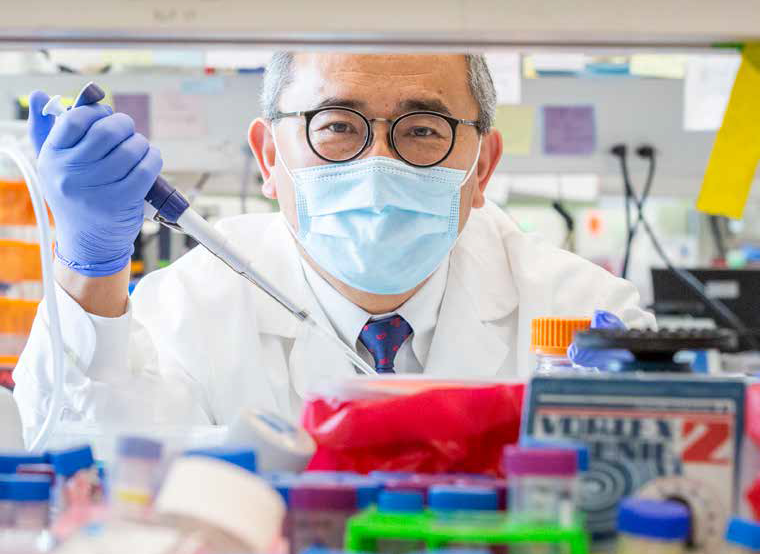
Jae Jung, PhD, an internationally renowned expert in virology and virus-induced cancers, recently joined Cleveland Clinic as Chair of the Lerner Research Institute’s Department of Cancer Biology. Dr. Jung also serves as Director of the new Center for Global and Emerging Pathogens Research.
“I am excited to collaborate with Cleveland Clinic’s experts in genomics, immunotherapy, oncology and infectious disease to advance our knowledge of virus-induced diseases,” Dr. Jung says. “Cleveland Clinic’s robust clinical and research infrastructure in Cleveland and the new Florida Research and Innovation Center in Port St. Lucie will enable us to develop innovative and novel approaches for new therapeutics and vaccines and make them available to people around the world.”
Groundbreaking Cancer Research
As Chair of Cancer Biology, Dr. Jung will lead the department’s work in understanding the biological underpinnings of cancer ranging from genetic and molecular pathways to disease manifestation. The department is home to leaders in several cancer research areas including prostate cancer, glioblastoma and cancer stem cells.
“Jae Jung is a foremost authority in virus-related cancer and immunology who will build and grow our research programs to advance science and ultimately improve care for our patients,” says Brian Bolwell, MD, former chair of Cleveland Clinic’s Taussig Cancer Institute. “He will bring together a team of experts to better understand the complexities of these cancers and emerging pathogens to develop critically needed treatments and vaccines.”
Dr. Jung’s cancer research focuses on virus-induced cancers, including Kaposi’s sarcoma, the most common tumor in patients with AIDS. For his work in this disease area, the National Cancer Institute awarded him the prestigious Outstanding Investigator Award in 2016.
Investigating Viruses
The Center for Global and Emerging Pathogens Research, led by Dr. Jung, focuses on broadening the understanding of emerging pathogens, such as the Zika virus and SARS-CoV-2 (which causes COVID-19). The center spans the Lerner Research Institute, the Florida Research and Innovation Center, Cleveland Clinic Abu Dhabi and Cleveland Clinic London.
“Jae Jung is a brilliant and global leader in research into the deep and complex intersections between the immune system and cancer,” says Serpil Erzurum, MD, Chair of the Lerner Research Institute. “His work has defined how viruses induce cancers, which make up 20% of cancers in the world. It is quite fortuitous at this time that we have recruited a world-class scientist in cancer and virus research, propelling our teams in Cleveland and Florida forward in both of these significant areas.”
Dr. Jung has several research projects related to coronaviruses, including vaccine and drug development, and has developed one of the first preclinical models to study SARS-CoV-2 infection and transmission to lead to development of a COVID-19 vaccine. His vaccine work utilizes nanoparticles that compel the coronavirus to use its own surface protein to produce antibodies that block viral infection. The hope is that this approach will have fewer side effects than other vaccines, especially among older people who are particularly susceptible to COVID-19.
“The safety of a vaccine is currently a widespread open concern, especially in aged people who have weakened immunity,” says Dr. Jung. “The protein-containing nanoparticle is an ideal vaccine candidate due to its strong antigenicity and safety. We found that this vaccine induced very strong neutralizing antibody in vaccinated pre-clinical models that protected against lung infection.”
He’s also advocating for patience when it comes to the pace of research, especially basic research. “Research is investigating and identifying what the problems are and how those problems happen before we start to fix the problems,” he says. “Scientific advancement always depends on a strong foundation of data credibility, and typically this does not happen overnight but often over a period of time.”
The Importance of Philanthropic Support
Although Dr. Jung has received several large federal grants to further his investigations, he says private philanthropy plays an important role in two ways.
“First, it can support new ideas or exploratory research that my federal funding cannot initially support,” he says. “So I can use the philanthropy funding to develop preliminary data and projects with collaborators to jump-start research that can be subsequently supported by federal funding.”
Philanthropy also makes a difference by supporting new, important projects that are less favorable topics for federal funding because that type of funding is primarily targeted to “hypothesis-driven” research. He points to his work in vaccine stabilization as an example. “As a majority of human vaccines require refrigeration, their delivery to underdeveloped countries is often impossible,” Dr. Jung says. Philanthropic support was essential for Dr. Jung and his team to successfully develop a thermostable poliovirus vaccine that has the potential to save countless lives.
Dr. Jung joins Cleveland Clinic from the University of Southern California, where he was Chair of Molecular Microbiology and Immunology and Director of the Institute of Emerging Pathogens and Immune Diseases. He earned his PhD in microbiology from the University of California, Davis. He completed postdoctoral training and was later promoted to professor at Harvard Medical School. He is an elected fellow of the American Association for the Advancement of Science and the American Academy of Microbiology.
How You Can Help
Your gift to our COVID-19 Response fund will help support high-priority research like Dr. Jung’s.
New Blood Test Can Identify Silent Cancers
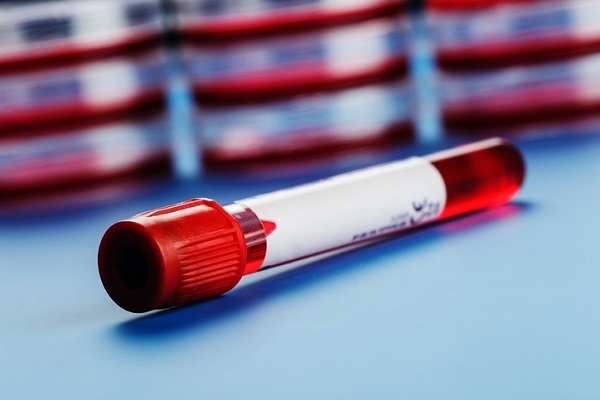
Early-detection screening tools exist for very few types of cancer – breast, cervical, colon, lung and prostate. That means most cancers go undetected until they are more advanced and harder to treat. An investigational early detection blood test, however, may soon allow doctors to identify many “silent” cancers with a single blood draw.
The Galleri™ test, developed by biotechnology company GRAIL, works by detecting minute amounts of DNA that cancerous tumors shed into the blood. Chemical changes to the DNA are then analyzed to localize the cancer to a specific organ system.
Cleveland Clinic was part of a multi-site clinical trial known as the Circulating Cell-free Genome Atlas, which assessed the test’s effectiveness. Study results published in the Annals of Oncology showed the test could detect more than 50 cancer types with a high degree of sensitivity and a very low false-positivity rate, while pinpointing the organ of origin with 93 percent accuracy.
“Being able to detect small amounts of biological substances such as cell-free DNA from cancer cells in the blood is a big leap forward and opens the door to many new possibilities in cancer screening,” says Eric Klein, MD, Chair of Cleveland Clinic’s Glickman Urological & Kidney Institute and a senior author of the Annals of Oncology paper. “Now that we know the blood test can identify these often silent, high-mortality cancers, like pancreatic and ovarian cancer, we need to see how the test performs in clinical practice.”
PATHFINDER Study
Cleveland Clinic is participating in the next phase of research, the multi-center PATHFINDER study, which will evaluate the performance of the test in a healthy population and the care steps from the Galleri test to a final diagnosis. It will be used for the first time by oncologists to help guide a patient’s care and will allow investigators to track which follow-up tests are used to confirm or deny a cancer diagnosis.
“We want to know if using this test will allow us to identify cancers in patients at average or elevated risk of cancer before they exhibit clinical signs or symptoms,” says Dr. Klein, principal investigator of Cleveland Clinic’s arm of PATHFINDER. “The goal is to gain a greater understanding of how the test may be implemented in routine care and eventually as a potential population screening tool.”
Dr. Klein stresses that the Galleri test is intended to be complementary to, and not a replacement of, U.S. guideline-recommended cancer screenings, such as mammography and colonoscopy. But he also notes that the findings may someday impact how patients with an established cancer diagnosis are monitored, potentially augmenting or even potentially replacing current imaging protocols.
“Early detection is key to catching cancer when it is most curable,” Dr. Klein adds. “But today, there is no screening mechanism available for the majority of cancers, which is why this research is incredibly important and could have far-reaching implications.”
The PATHFINDER study will enroll approximately 6,200 participants across six participating health systems, including Cleveland Clinic, and follow them for 12 months. It is open to men and women, 50 and older, who meet the eligibility criteria.
Learn More
Listen to @EricKleinMD and @ShepardDale on our Cancer Advances podcast as they discuss the PATHFINDER Study and the path forward to further validate this multi-cancer detection approach. Listen or view the transcript here.
How You Can Help
Philanthropic support is essential to Cleveland Clinic’s research mission. Your gift to support cancer research creates opportunities for scientific discovery, treatment and therapies. Please make a gift today.
Going the Distance for the Cause
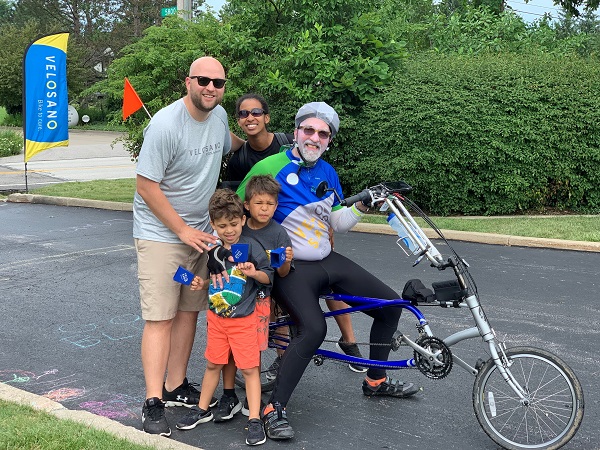
In 2015, Robert T. Goehrke, PhD, CEO and co-founder of International Products Group in Greater Salt Lake City, found himself standing on a stage in Cleveland with tears streaming down his face.
Bob, as he prefers to be called, had flown in from Utah specifically to ride in VeloSano’s signature event, the Bike to Cure weekend. Then in only its second year, VeloSano already had passionate supporters. It was about to win over another.
A former Ironman triathlete, Bob had no particular expectations for the weekend except to fulfill a pledge to cycle 50 miles on his recumbent bike and raise funds for cancer research. “I took my grandkids to the party the night before. There was a band, and all of a sudden, we were doing the ‘Living Hope’ picture, which is for all cancer survivors who are riding or volunteering for VeloSano,” he recalls.
“I’m thinking, that’s me. I’m a cancer survivor. And I got up there, and I’m with all these people, young and old, who are cancer survivors. I choked up. Even though I didn’t know any of these people, it was like they were all my best friends.”
The next day, he dedicated his ride to “the incomparable” Jihad Kaouk, MD, Director of the Center of Advanced Laparoscopic and Robotic Surgery and holder of the Zegarac-Pollock Endowed Chair in laparoscopic and robotic surgery within the Glickman Urological & Kidney Institute. Dr. Kaouk performed Bob’s surgery for prostate cancer in 2011.
“And then, unfortunately, every year thereafter, we lost a close family member to cancer — my mom, my sister-in-law, my best friend. So then it became every year I would dedicate my ride to someone very close to me and to my family,” he says.
This year was different. For 2020’s virtual VeloSano, Bob, who turns 64 this Oct. 16, did the Insanity workout every day in June. “It’s brutal, especially for someone my age. Sometimes I was on the floor panting for breath, but I probably kept up with 90 percent of it.” Still, he says, “I prefer the 50-mile ride, so I hope that we’re back to the traditional VeloSano next year.”
A native New Yorker, Bob evolved from “a high-powered corporate exec eating hot dogs off the street” into someone who pays more attention to his health, especially after having had cancer followed by open heart surgery, in 2014, by “the iconic” Marc Gillinov, MD, to repair mitral valve prolapse. Dr. Gillinov, Chair of the Department of Thoracic and Cardiovascular Surgery in the Sydell and Arnold Miller Family Heart, Vascular & Thoracic Institute, holds the Judith Dion Pyle Chair in Heart Valve Research.
Bob was working for Bristol-Myers Squibb in 1994 when the company acquired Solon-based Matrix Essentials Inc., which was founded by the Millers.
“I had the pleasure of knowing both Arnie and Sydell,” Bob says. “Arnie was a legend in the salon industry. Sydell is a very thoughtful, lovely, passionate person. She and I worked together probably almost a year.”
At first leery about being transferred from New York to Cleveland, Bob says, “From Day 1, my family and I felt so at home in Cleveland.” When he moved to Utah 15 years ago, he kept his house in the Cleveland area to be close to his three grandsons and to his medical team at Cleveland Clinic.
“I love my doctors and surgeons,” he says. “I believe that as a patient, you need to have a connection with your doctor, your surgeon. It’s important that they understand what you as a consumer are looking for, what your concerns are, what your hopes are for the outcome. I don’t want to lose that. It’s important for me to maintain those relationships with what I call the very best hospital in the world, Cleveland Clinic.”
In honor of his care providers, Bob and his wife, Tish Poling, recently made a five-year annual commitment benefiting VeloSano.
“I think that the moral of the story is the fact that I’m living an active, and completely healthy, life that I attribute directly to the amazing and proactive care that I’ve gotten from Cleveland Clinic,” he says. “I cannot be more thankful to the Clinic and to all my medical professionals there.”
How You Can Help
It’s not too late to make a gift to VeloSano! 100% of the dollars raised supports Cleveland Clinic's cancer research. Every mile that our participants ride, and every dollar that our donors give,inspires Cleveland Clinic caregivers to pursue research that will make a difference in patients’ lives. Learn more about VeloSano here.
Getting Ready to Take Center Stage
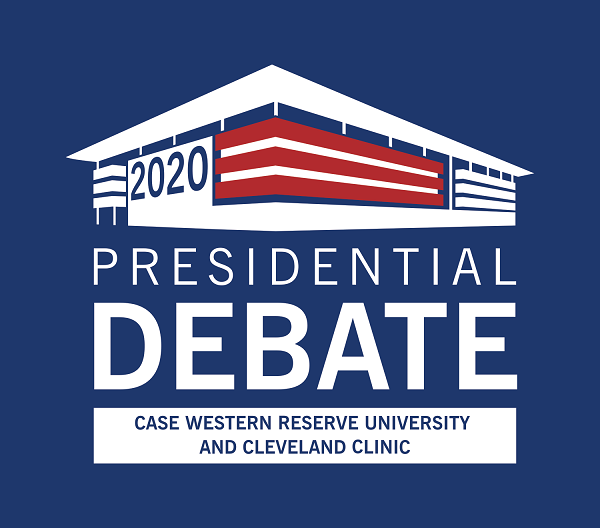
Earlier this year, the Sheila and Eric Samson Pavilion, located inside the Health Education Campus of Case Western Reserve University and Cleveland Clinic, was transformed into Hope Hospital. The hospital was temporarily established to care for a potential surge of up to 1,000 patients in the early days of the COVID-19 pandemic.
Thankfully, due to successful COVID-19 curve-flattening measures, the space was returned to its former state as an educational campus over the summer.
Today, the 477,000-square-foot pavilion is undergoing yet another transformation.
On Tuesday, Sept. 29, the Health Education Campus will take center stage as the host site of the first U.S. presidential debate in 2020.
The announcement from the Commission on Presidential Debates came in late July, after original host University of Notre Dame withdrew because of the complexities COVID-19 created for its fall semester.
Even before Cleveland was chosen for the new debate site, the Commission on Presidential Debates had retained Cleveland Clinic to serve as its Health Security Advisor for all four of the scheduled General Election debates.
During a time when a health pandemic is taking centerstage in the U.S., having a presidential debate in the shared Health Education Campus highlights the critical importance of both healthcare and scientific discovery.
“Healthcare has long been at the center of every plan for social progress,” says Tom Mihaljevic, MD, Cleveland Clinic CEO and President. “Now, COVID-19 is sparking renewed discussion around the future of our industry. We are proud to host this important dialogue before a global audience on Sept. 29.”
The specifics of the debate plans remain flexible as the status of the COVID-19 pandemic is ever-changing, but debate precautions will be aligned with county, state and CDC guidelines.
A broad range of risk-mitigation strategies, including limiting audience size, incorporating personal health screening and safety measures, and implementing disinfectant measures, will be in place.
“We are all challenged with adapting to a ‘new normal,’ and safety is key as we all face this pandemic together,” says James Merlino, MD, Chief Clinical Transformation Officer at Cleveland Clinic and Chief Health Security Advisor to the Commission on Presidential Debates for the 2020 General Election. “Cleveland Clinic has been focused on understanding, containing and preparing for COVID-19. We are sharing our knowledge and advising various industries to help keep our communities safe.”
After the Sept. 29 debate, Cleveland Clinic will continue to serve as Health Security Advisor to the Commission on Presidential Debates. This includes two presidential debates in Miami and Nashville, as well as the vice presidential debate in Salt Lake City.
The event is sponsored and produced by theCommission on Presidential Debates, a nonprofit, nonpartisan organization that has sponsored all general election presidential and vice presidential debates since 1988.
Fundraiser Supports ‘Connection to the Outside World’
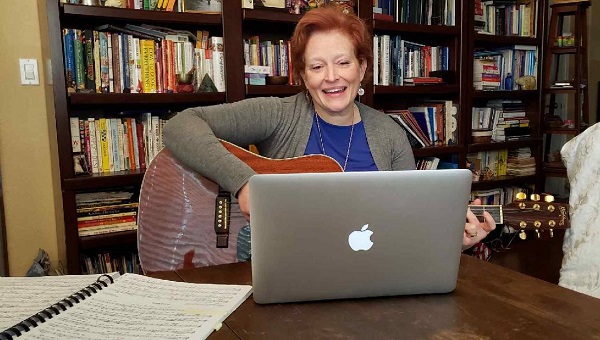
To honor World Alzheimer’s Day, Sept. 21, Keep Memory Alive (KMA) is hosting a virtual fundraising campaign to help caregivers with the challenges of caring for loved ones with brain disorders during the COVID-19 pandemic.
KMA is a nonprofit organization that increases awareness and raises funds for research, diagnosis and treatment of brain disorders, including Alzheimer’s disease, Parkinson’s disease, multiple sclerosis and others, at Cleveland Clinic Lou Ruvo Center for Brain Health.
Now through Sept. 21, your gift to KMA or purchase of KMA-branded items will support specific program needs, such as music therapy sessions, art therapy kits, and counseling sessions for patients and their caregivers.
“Being on videoconference for music therapy, for art programs, this is our lifeline,” says Linda, a caregiver for her husband, who receives treatment at the Lou Ruvo Center for Brain Health. “It’s our connection to the outside world. It’s as if we’re out of quarantine, if only for an hour.”
Visit our website to make a gift to support patients and their caregivers, as well as find information, videos and fundraising opportunities. Or text 76278 to KMA to access the site through your mobile device.
Fishing for a Cure: A Mother Keeps Her Son’s Legacy Alive
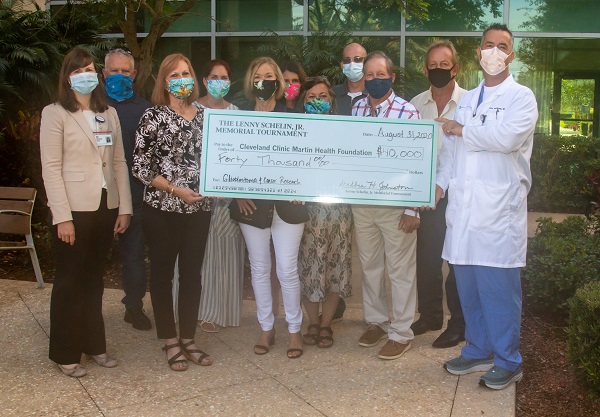
“Lenny was a real charmer. He could smile at someone he just met and they would no longer be strangers.”
Remembering her son, Debbie Johnston also smiles, with both sadness and determination.
In 2018, Lenny Schelin Jr. passed away at the age of 33. Just 17 months earlier, he was diagnosed with glioblastoma, an aggressive form of malignant brain tumor. To honor him, Debbie and her family, along with his former boss Tony Huarte,created a foundation to raise awareness and funds for glioblastoma research through the annual Lenny Schelin Jr. Memorial Tournament.
"My son was a big fisherman," Debbie says. "We began developing the tournament around the time of Lenny's passing and this will be our third year. We hope to keep Lenny's legacy alive and do something good out of the bad things that happen.
In previous years, proceeds from the tournament benefited a cancer center in Miami, where Lenny was primarily treated. This year, Debbie wanted the funds to stay local.
“We made the decision as a family to donate the funds to Cleveland Clinic Martin Health, and it was an easy one because we wanted to keep it in the community,” Debbie says. “Just knowing that we have this research center here was a no-brainer.”
Debbie, along with family and friends, recently presented Cleveland Clinic Martin Health with a check to fund glioblastoma research. Accepting the check was Oszkar Szentirmai, MD, a neurosurgeon affectionately known as “Dr. Oz,” who met Lenny before he passed away. Dr. Szentirmai is a primary investigator for the glioblastoma research that will take place at the Florida Research and Innovation Center, Cleveland Clinic Florida's new facility in Port St. Lucie.
“I'm just very grateful today,” Dr. Szentirmai says. “I think lives will be impacted in the future. It’s a tremendous boost to our initial effort to study these tumor cells.”
Michaela Gack, PhD, Scientific Director at the Center, says this gift will help researchers investigate new ways to target and block the growth of glioblastoma cells.
“Currently, research in this field is very minimal,” Dr. Gack says. “Over the next few years, we plan to expand glioblastoma research, as well as research into other rare cancers for which there is currently no cure.”
The Florida Research and Innovation Center complements and expands research underway at the Florida health system’s five hospitals and at the Lerner Research Institute, home to 190 laboratories on Cleveland Clinic’s main campus in Cleveland, Ohio. The scientific teams closely collaborate, tapping into resources at both facilities to develop new treatments for patients around the globe.
To honor Lenny’s legacy, Debbie is doing exactly what he wanted.
“Lenny once told me, ‘I don’t want to be forgotten, Mom,'to which I replied that I didn’t think that could ever happen. He just made such an impression on people.”
How You Can Help
Your gift to support glioblastoma research at the Florida Research and Innovation Center will help expand brain cancer research and other rare cancers to provide early cancer screening and detection, more effective medications to extend life, and improved quality of life for those fighting brain cancer.

